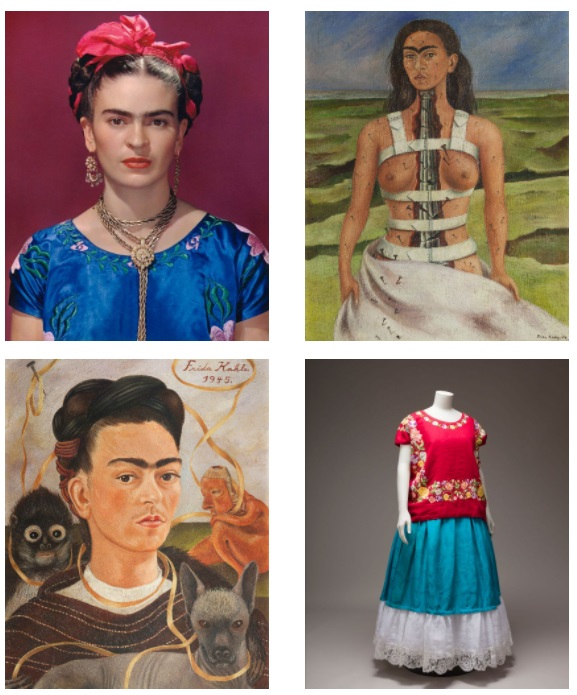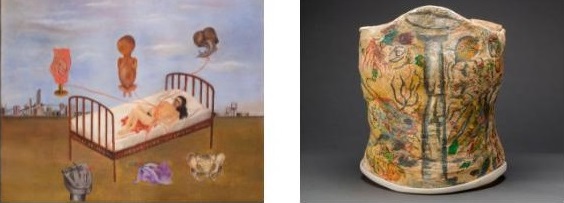From 8 October 2021 to 27 March 2022, the Drents Museum is proudly presenting a world premiere with a major exhibition devoted to the iconic Mexican artist Frida Kahlo (1907-1954). Two of the leading Kahlo collections will come together for the first time in Assen. Viva la Frida! - Life and Art of Frida Kahlo showcases an unparalleled combination of Kahlo's art and personal objects (such as clothes, painted corsets and jewellery). The Drents Museum collaborated with the Museo Dolores Olmedo and the Museo Frida Kahlo (formerly La Casa Azul, The Blue House) in Mexico City. This partnership offers the Drents Museum the unique opportunity to tell the complete Frida story Masterpieces from the Olmedo Collection
The Museo Dolores Olmedo in Mexico City boasts the largest collection of Frida Kahlo's work in the world and is making available its entire Kahlo holdings. Dolores Olmedo (1908-2002) was a close friend and the heiress of Kahlo’s husband, the artist Diego Rivera. Dolores Olmedo was committed to preserving Mexican art and, under Rivera's guidance, she acquired a large number of key pieces by Frida Kahlo. Highlights from this collection – such as Frida Kahlo, Henry Ford Hospital, 1932, oil on metal, Museo Dolores Olmedo, Mexico City © 2021 Banco de México, Ciudad de México/ reproduction courtesy of the Instituto Nacional de Bellas Artes y Literatura, 2021.
|
Kahlo’s Henry Ford Hospital (1932),

Frida Kahlo, The Broken Column, 1944, oil on canvas on masonite, Museo Dolores Olmedo, Mexico City © 2021 Banco de México, Ciudad de México/ reproduction courtesy of the Instituto Nacional de Bellas Artes y Literatura, 202
The Broken Column (1944)
and Self-Portrait with Monkey (1945) – are coming to Assen. Personal Belongings from The Blue House
Thanks to the Museo Frida Kahlo, visitors to Viva la Frida! can admire not only clothes, painted corsets and jewellery, but also photos, documents and drawings related to the artist. In 2004, many of Kahlo and Rivera's possessions were found in La Casa Azul, or The Blue House (now the Museo Frida Kahlo) after being hidden from view for 50 years. After careful research and conservation this exceptional collection was opened to the public in 2007. Indelible Impression
Frida Kahlo made an indelible impression with her bold sense of beauty and ideals of equality for all. A tragic bus accident left Kahlo in great pain and requiring numerous operations. Although her life was largely defined by misfortune, she managed to transform her suffering and emotional struggle into extraordinary works of art. What gave her the strength to go on was her great love for art, for Diego Rivera, and for Mexico and its popular folk culture. Young and old people all over the world still draw strength and inspiration from her art and life story. Viva la Frida! In Assen, dozens of personal belongings and 42 artworks by Frida Kahlo will soon be on display in the large exhibition hall, including 28 paintings and 14 works on paper. The short film Meet Frida will be screened in the Abdijkerk (Abbey Church). The exhibition and the accompanying book Viva la Frida! - Life and Art of Frida Kahlo (WBOOKS, 2021) shed new light on Frida Kahlo's world and how culture, politics, gender, disability and national identity influenced her life, her style, and her taboo-breaking art.
|
|
|


Captions: (left to right, top to bottom)
- Nickolas Muray (1892-1965), Frida Kahlo in Blue Blouse, 1939, photograph, Throckmorton Fine Art, New York / Photo by Nickolas Muray, © Nickolas Muray Photo Archives
- Frida Kahlo, The Broken Column, 1944, oil on canvas on masonite, Museo Dolores Olmedo, Mexico City © 2021 Banco de México, Ciudad de México/ reproduction courtesy of the Instituto Nacional de Bellas Artes y Literatura, 2021
- Frida Kahlo, Self-Portrait with Monkey, 1945, oil on canvas, Museo Dolores Olmedo, Mexico City © 2021 Banco de México, Ciudad de México/ reproduction courtesy of the Instituto Nacional de Bellas Artes y Literatura, 2021
- Huipil (tunic), before 1954, Juchitán de Zaragoza, Oaxaca, Mexico, hand-embroidered cotton muslin. Enagua (skirt) and holán (flounce), before 1954, Coyoacán, Mexico City, Mexico. Skirt: silk woven with complex patterns; flounce: cotton tulle trimmed with lace, Museo Frida Kahlo © 2021 Banco de México Diego Rivera & Frida Kahlo Museums Trust, Mexico City
-Frida Kahlo, Henry Ford Hospital, 1932, oil on metal, Museo Dolores Olmedo, Mexico City © 2021 Banco de México, Ciudad de México/ reproduction courtesy of the Instituto Nacional de Bellas Artes y Literatura, 2021
- Painted plaster corset, 1944, plaster, medical bandages and paint, Museo Frida Kahlo © 2021 Banco de México Diego Rivera & Frida Kahlo Museums Trust, Mexico City/ reproduction courtesy of the Instituto Nacional de Bellas Artes y Literatura, 2021



